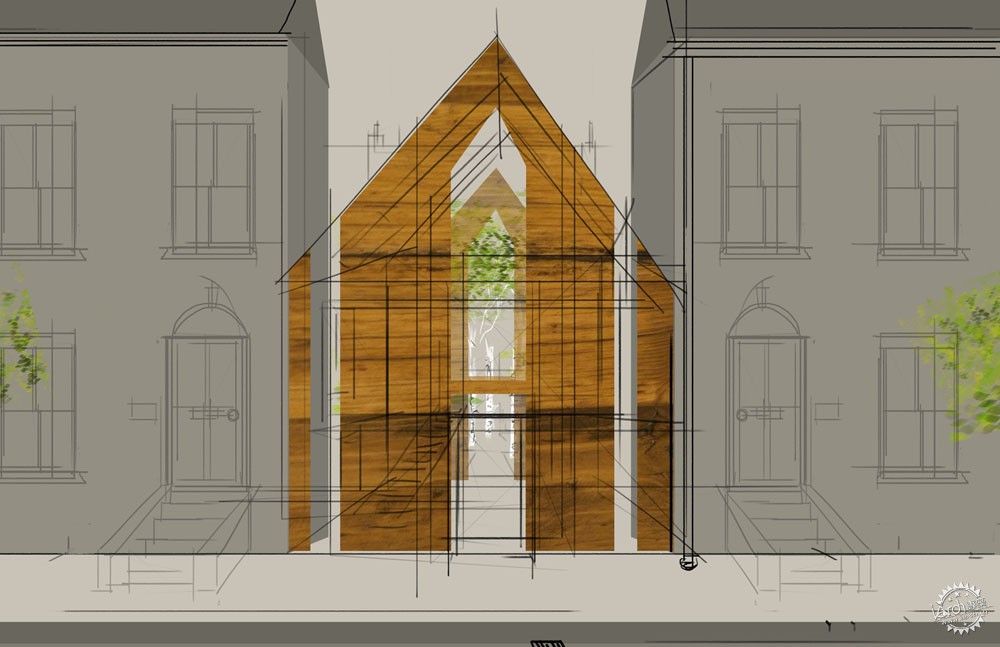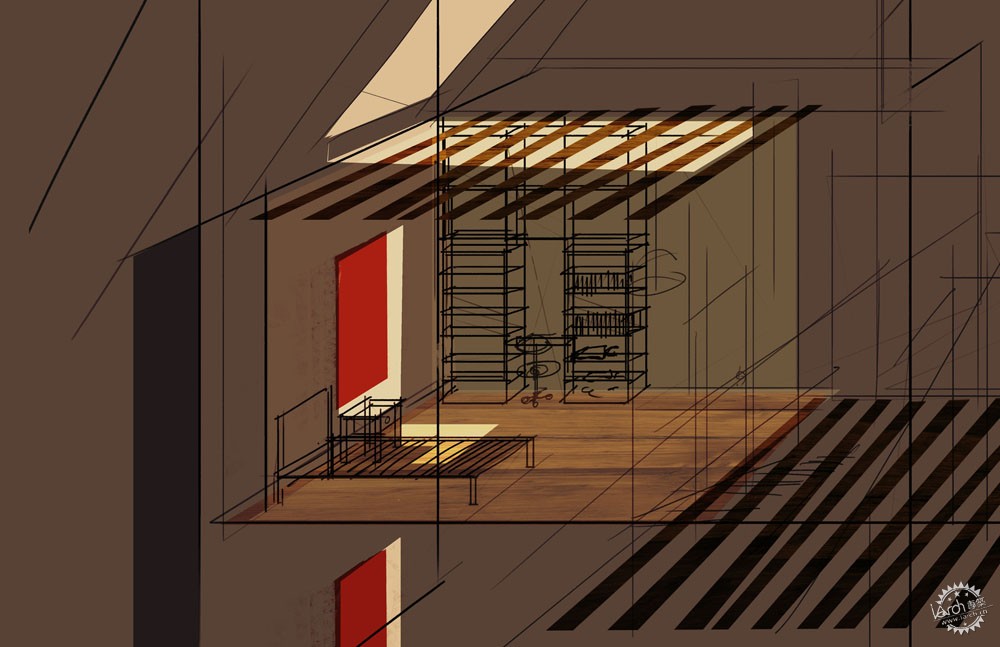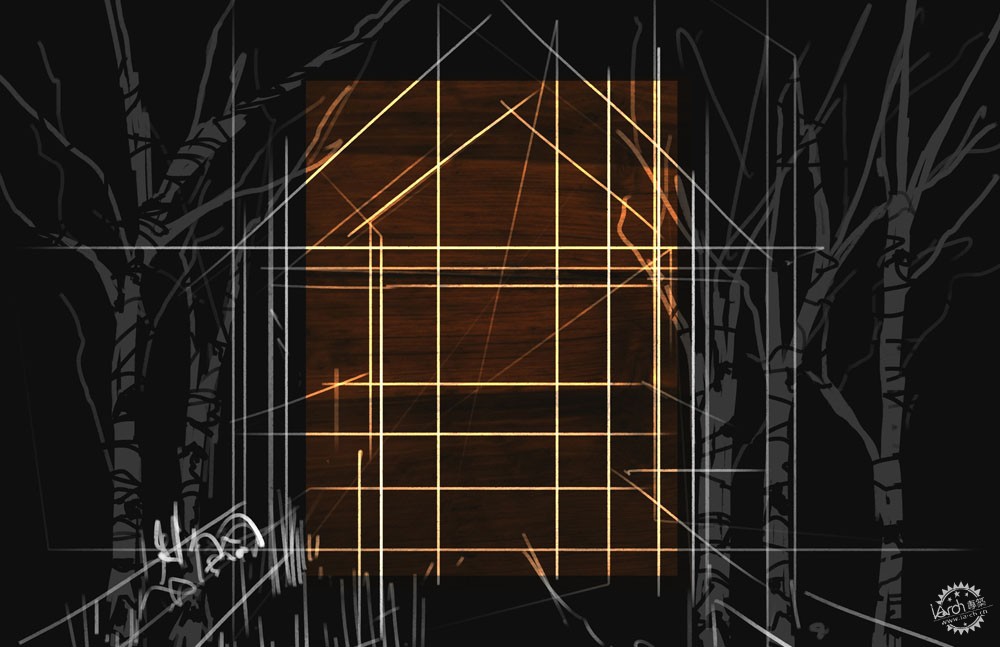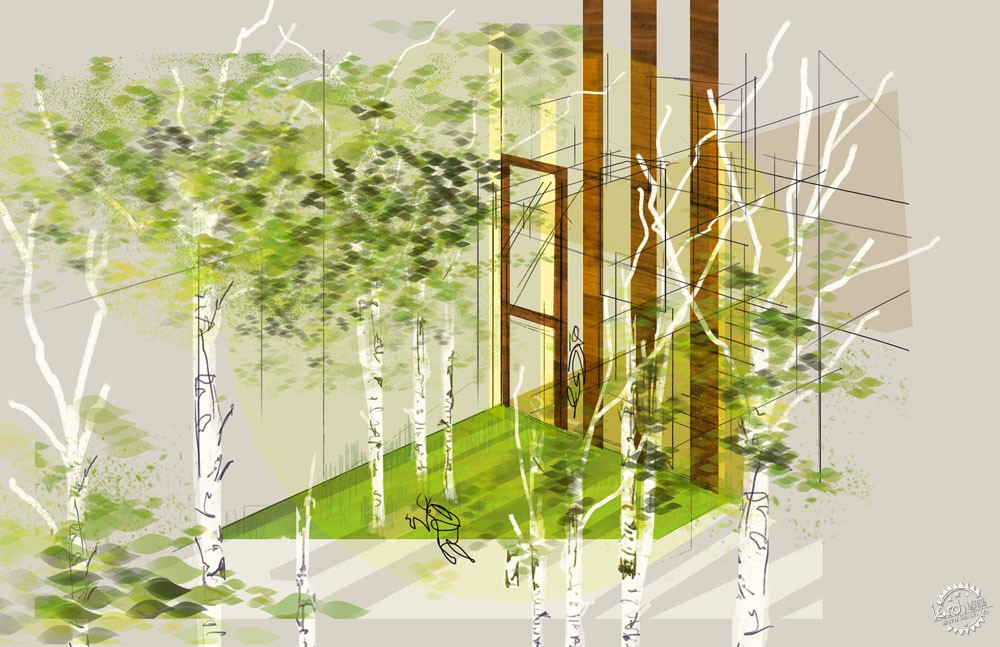
The Architecture of Memory: A Tale on the Importance of Design and Well-being
由专筑网李韧,蒋晖编译
所有形式的建筑都能够触发人们的情绪,同时也能对人们的先天能力产生一定的影响。所以,当前针对建筑、景观、健康之间的研究也很多。
在2018年“Blank Space Fairytales”中,来自Studio 31 Landscape Architects的Katie Flaxman描述了一个关于父亲Horace的故事,Horace是一位建筑师,但是患有老年痴呆症,同时还有一位晚辈Rowan。这个故事描述了Horace在不同的医院辗转,并进行治疗,后来在一座专为健康而设计的建筑中改善了身心状况。
下文是来自Flaxman的虚拟故事,插图来自建筑艺术家Sam Wilson。
Architecture, in all its forms, has the innate ability to trigger our emotions and alter our perceptions. Consequently, a lot of light is currently being shed on the relation between architecture, landscape, and health.
In the 2018 edition of the Blank Space Fairytales Competition, Katie Flaxman from Studio 31 Landscape Architects, wrote a story of a father, Horace, an architect suffering from late-stage dementia and his offspring, Rowan. The fiction describes Horace’s journey in different healthcare institutions and how his presence in a building and landscape properly designed for well-being, improved his psychological and physical health.
Here are some excerpts from Flaxman's fictional story, illustrated by architectural artist Sam Wilson.

“这个房间是长方形的,有着斑斑点点的塑料墙体和天花吊顶。通过窗户我能够看到对面建筑的红色砖石,光线能够从这里进来。所有的建筑都应该面向东方,我的第一位老师就是这么教我的,当离开房间,来到花园,太阳能够照射到你身上。”——Horace
“It’s square, too square, this room with its freckled plastic walls and felted ceiling. The window, bizarre and pointless exhibits the red brick of the building next door. It casts a shadow where light should be… All buildings should point to the east, my first mentor taught me that. The sun should rise on your face as you leave your house and set on your garden when you return.” - Horace

“他是一位建筑师、工程师。这类人似乎无法容忍四面墙和一个小窗户。病痛一直折磨着他,他有些健忘,常常会忽略一些不想承认的事实。妈妈以前就常问,难道所有的建筑师都这么奇怪吗?”——Rowan
“He was an architect, an engineer really. The best of his kind now doomed to four intolerable walls and a window that looks onto a fifth. I suppose the illness grasped him long ago; forgetfulness and occasional eccentricities. But the eye doesn’t see what the mind won’t acknowledge, “Aren’t all architects eccentric?”, that’s what my Mum used to say.” - Rowan

“这是一座建筑,橡树向上生长,看起来就像是大窗户,两边的树木也郁郁葱葱。枝丫在内部的地板上留下影子。它虽然紧凑,但也挺大的,虽然低调,但却迷人。光线照耀进来,建筑就像在呼吸。穿过建筑的生命就像树木的枝叶。在这里,我也能好好呼吸。”——Horace
“Now this was a building! Oak timbers stretching skywards and framing generous windows. Windows that were flanked by birch, ash, and aspen. The trees themselves casting swaying shadows across the timber floors inside. It was compact but not small, unassuming yet captivating. Light poured into its form and the building breathed. Life ran through it as it had once run through the veins of the trees which formed its bones. Here, I could breathe too.” - Horace

“他摸了摸覆层,粗糙的木材摩擦着他的皮肤。高高的青草在沙沙作响,他问了我一个问题,但他并没有转身,‘告诉我,这座房子是谁建造的?’他的问题让我迷茫,似乎要让我窒息,‘这座房子是谁建造的?’我有些哽咽,有个声音在心里说,‘爸爸,是你建造的呀!’。”——Rowan
在本次竞赛中,Louis Liu与 Senyao Wei通过他们的作品“Deep Pool That Never Dries”获得了第一名,这个故事描述了城市新闻报道的时效性,也描述了新闻报道对于人们生活的改变。在今年,由Tatiana Bilbao、Mark Foster Gage、Jürgen Mayer、 Moshe Safdie组成的评审团将为最具创意建筑童话故事的获奖者颁奖。
“He ran his hand along the cladding, the rough timbers catching his skin softly as he went. The tall grasses rustled against his outstretched arm and without turning he asked a question, “Tell me. What kind of a man built a house like this?”... His question clung to me like a fog; humid and suffocating. “What kind of a man built a house like this?” I pushed the lump in my throat down and finally, a voice found its way out, “You did, Dad. You did”. - Rowan
The Competition awarded Louis Liu and Senyao Wei with the first price for their work on “Deep Pool That Never Dries”, a story which debates the validity of news reporting within the city, and how it alters the lives of those solely relying on it. This year, a jury that includes Tatiana Bilbao, Mark Foster Gage, Jürgen Mayer and Moshe Safdie will be awarding participants with the most creative architectural fairy tales.
|
|
